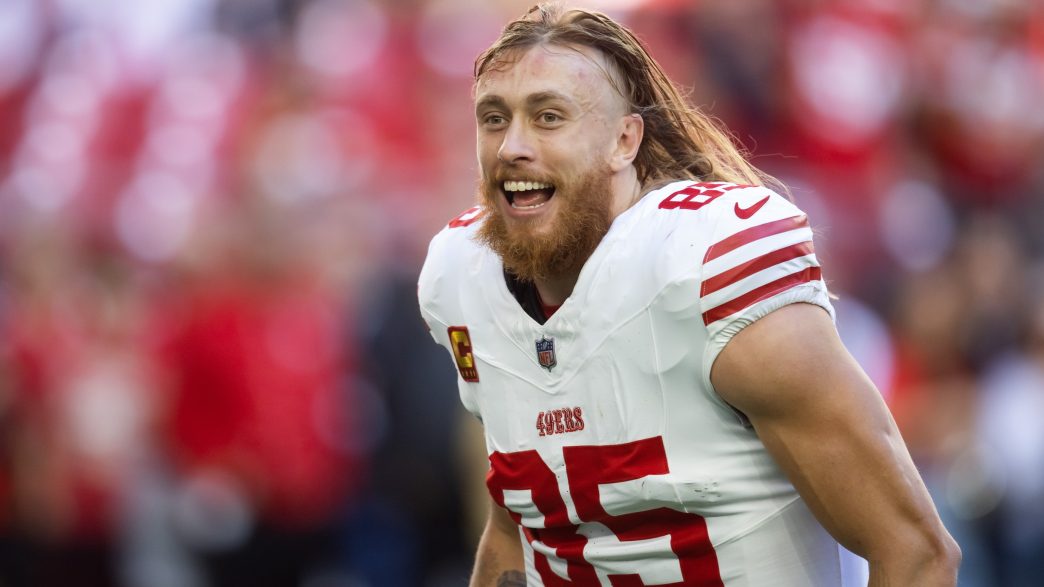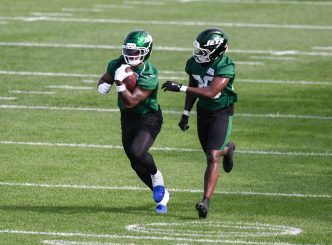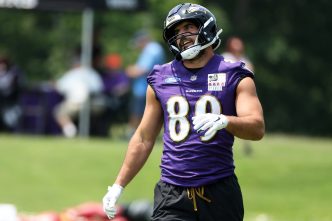With George Kittle securing a hefty $76.4 million contract extension with the San Francisco 49ers, the NFL tight end market is on the brink of a transformative shift. This deal, featuring $40 million guaranteed, not only underscores Kittle’s value but also sets a powerful precedent for the future of the position across the league.
Kittle’s contract directly impacts other elite tight ends, namely Dallas Goedert, David Njoku, Mark Andrews, and Kyle Pitts, who are all poised to benefit as the financial landscape for tight ends evolves. Let’s break down how this recent development influences each of these players from a financial, tactical, and organizational perspective.
1. Dallas Goedert (Philadelphia Eagles)
Dallas Goedert is quietly establishing himself as one of the league’s most complete tight ends. His dual-threat ability—serving as both a reliable pass-catcher and a sound blocker—makes him an invaluable asset to the Eagles’ offense, particularly as Jalen Hurts continues to grow as a franchise quarterback.
Kittle’s extension amplifies the value of well-rounded tight ends. Teams are clearly willing to invest in players who can contribute in multiple ways, and Goedert fits that bill perfectly. As he is entering the final year of his current deal, Kittle’s new average annual value (AAV) could serve as a benchmark for what Goedert might expect in a future extension or restructure. Given his consistent performance and team-first mentality, the Eagles would be wise to keep him aligned with market expectations.
Market Impact: If Goedert maintains his high level of play, we could see his value rise above $20 million per year, especially as other salaries see upward adjustments post-Kittle.
2. David Njoku (Cleveland Browns)
Once seen as a player with immense potential, David Njoku has developed into a vital contributor for the Browns. His reliability in red zone situations and on third downs has made him an essential target in Cleveland’s offense.
Kittle’s deal not only establishes a financial baseline for tight ends but also elevates the discussion about the value tight ends bring to their teams. Njoku’s size and athleticism make him a tough matchup, and with a new rookie quarterback potentially taking the helm, leveraging Njoku’s abilities could be paramount to aid in the transition.
Market Impact: Should Njoku’s productivity continue, he might find himself reworking his deal during the 2025 season, potentially exceeding $21 million as salaries for top-tier tight ends rise.
3. Mark Andrews (Baltimore Ravens)
As one of the most impactful tight ends in the game, Mark Andrews has consistently been a focal point of the Ravens’ passing attack. His strong connection with quarterback Lamar Jackson only enhances his value.
Though Andrews signed a four-year, $56 million deal back in 2021, Kittle’s recent contract could make his current deal appear undervalued. Andrews’ overall productivity and leadership could mean he’s up for an extension sooner rather than later, particularly amidst the ever-increasing salaries for tight ends.
Market Impact: If Andrews continues with strong performances, he’s in a prime position to negotiate a deal that could see him hitting that $20 million annual mark, making him one of the highest-paid tight ends in the league.
4. Kyle Pitts (Atlanta Falcons)
Coming into the league as one of the highest-drafted tight ends ever, Kyle Pitts has thus far faced challenges due to inconsistent production amidst quarterback changes and scheme limitations. However, his innate talent and physical attributes keep him on the radar as a generational talent.
Kittle’s contract signals that teams are beginning to appreciate the versatility and potential of tight ends like Pitts, who embody a hybrid role in the modern offense. With new quarterback Michael Penix Jr. expected to start, Pitts could see his production spike, making the Kittle deal a significant motivator for future negotiations.
Market Impact: A strong season for Pitts in 2025 could set him up for a lucrative extension, somewhere between $18 to $20 million annually, especially if he demonstrates elite talent worthy of a top-market extension.
Final Thoughts
George Kittle’s new contract isn’t just a significant payday for him; it’s a potential game changer for the entire tight end market. For Goedert, Njoku, Andrews, and Pitts, this deal sets a new benchmark, confirming that tight ends are key players rather than just supplementary options in modern NFL offenses.
As teams continue to leverage tight ends as game-changers, securing elite talent in this role will become increasingly critical. Kittle’s deal heralds a new era for tight ends, positioning this group to redefine their worth in the league moving forward.








